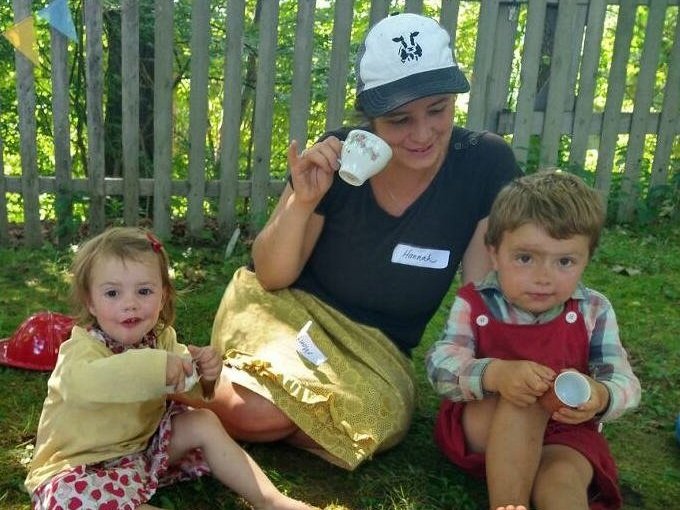An Interview with 350VT Volunteer Hannah Morgan
By Claire Greenburger
Claire Greenburger is the 350Vermont Media and Communications Fellow for Summer 2022. Claire is a Middlebury College student, studying environmental justice and creative writing.
“The biggest thing that keeps me hopeful is my kids. And as a parent, I have to have hope.”
– Hannah Morgan
Can you tell me a little bit about yourself? Where in Vermont do you live, and how long have you lived here?
I grew up in Hartland, but I live in Plainfield now. I’ve lived here for [about] 10 years.
Do you live with family?
Yeah, I’m married, and I have two kids, a one-and-a-half-year-old and a three-and-a-half-year-old––so, that’s chaotic!
And we have 10 acres and are aspiring homesteaders. Right now, we have chickens, and we’re raising three turkeys for meat birds, and we have a big greenhouse and huge gardens.
That sounds like a dream. What’s something that you love about Vermont as a state?
Oh my gosh, I love Vermont. I never ever plan to leave. I absolutely love the seasons. [I like to] cross country ski in the winter and swim way out in big lakes in the summer.
How is climate change impacting your life in Vermont?
What first comes to mind is how privileged I am, in that changes I am experiencing are not life threatening, as they already are in so many places. We are lucky to own land and be able to put in perennials and do things that make me feel like we’re resilient in terms of being able to support our family and prepare for more unstable weather and growing conditions.
I’ve definitely noticed how the weather has changed since my childhood in Vermont. The winters are much more unpredictable: a big snowstorm and good skiing conditions is a big excitement now. [There’s also more] intense heat in the summers: we have to water our vegetables more than my family did growing up. [However,] I also know that those are minor changes compared to what a lot of people all over the world [are experiencing]. We are also hyper aware of ticks and lyme disease now, doing thorough tick checks every night, and that is a new thing, directly related to the changing climate.
For me, the psychological impacts are huge. It’s a constant source of anxiety that I’m constantly learning to manage
Yeah, I can definitely relate to that anxiety. Has there been anything that’s helped you manage it?
Time in nature and exercise are both really helpful for me. And also trying to get into a different mindset of gratitude and focusing on what I’m grateful for in my life, instead of fear about what is possibly to come. Also being involved in organizing for climate justice and putting my anxiety into action is important and helpful.
What motivated you to first get involved with 350VT and Families Rise Up, and why did you feel like you needed to take action on climate change?
Climate change is something that has been front and center for me for a long time, in terms of what I care about and what I feel really anxious about. I had been involved in direct action campaigns and activism throughout my 20s, but then I took a step back from that and did “a bunch of the adult things,” like got married, found land, built a house, and had kids––so that took up my focus for the last several years.
But then, having a baby also really increased my sense of urgency and anxiety about the climate crisis. It put [the crisis] in a whole new perspective––loving someone else this much, who’s going to grow up in this changing world, made me want to do everything I can in the time that I have.
At the time when I had my first baby, Families Rise Up was called Mother Up. And that group was such a gift to me because I was definitely feeling isolated and having some postpartum anxiety. Finding this group that was specifically for parents to focus on climate justice was really important. [It gave me a space] to have a sense of community and be with people who understand the despair and harder feelings that come up.
From what I’m hearing you say, that group was a way of turning your anxiety into something potentially helpful and meaningful.
Yes, definitely. And it felt like a really nice avenue back into organizing in a way that fits into where I’m at in my life right now.
What is your role in 350Vermont now? Can you tell me about a specific project or action you are working on and a bit about what Families Rise Up is doing?
I’ve been a volunteer organizer working with Heather Buckner for Families Rise Up.
In the last couple of years, [we’ve] done a number of actions and a couple of press conferences at the State House. We did a big clothing exchange on the front lawn of the state house to get families thinking about how to share resources and spread the word about Families Rise Up. And then for Earth Day this year, we had a nurse-in at the State House, which was really fun. We led some singing, and everyone nursed at the same time on the State House steps. We had signs and messaging about the connection between war and climate change; we got an op-ed published in the Vermont Digger about that topic and sent letters to all the legislators asking them to prioritize climate justice. [Specifically, we focused on] how climate is tied to conflicts, like the war in Ukraine.
This summer we’re working on ] building our community by bringing in more people through climate playgroups. It’s a very low-key environment that’s kid and family friendly. We provide snacks, tea, games, and childcare support. The idea is to bring parents together to hear what they’re thinking and excited about in terms of climate organizing. We also want to [invite] people who have never organized before. At the climate playgroup last Saturday, we had nine families, and we planted three linden trees at the Plainfield Rec Field. It was really fun!
For a lot of people, especially parents, I’m sure getting involved with activism is pretty daunting, just given the fact that they don’t have much time on their hands. I think what’s so incredible about what you’re doing is, by offering childcare and this wonderful community, you’re creating a space for these people in the movement.
Yeah, the intention is to make it feel tangible and accessible and like everyone has a place in climate organizing.
What do you see as the most important direction or point of focus for the climate justice movement right now? Where do you think 350 should be directing its attention and efforts?
I think it’s important to build relationships with many people across communities to hear what is directly impacting them and what people are wanting to organize around, especially frontline communities, marginalized communities and BIPOC people in Vermont––and that’s true for the climate movement in general.
As a blanket statement, [the climate movement] tends to highlight the voices of older, white men. We [also tend to] focus on statistics and the science of the climate crisis, which I think can be off putting for a lot of people [because] it doesn’t feel like it’s something that is meant for everyone to participate in, and it feels overwhelming and hopeless.
I find myself falling into this trap of using my feelings of urgency and fear to drive people to get more involved, but I don’t think that fear is the best way to inspire people and galvanize connection. So, I’ve been thinking about how to make this work exciting and accessible and feel like there’s a place for everyone. Love is such a better motivator than fear, and love connects everyone to climate justice work, because everyone has something they love that is or will be impacted by the climate emergency.
What keeps you hopeful and wanting to stay involved in the fight for climate justice, given all of the bad news that we face and the many challenges and obstacles that we need to overcome?
The biggest thing that keeps me hopeful is my kids. And as a parent, I have to have hope; I can’t afford to live in constant despair.
I don’t think that it’s just a “naive” hope. I do think that the universe is so full of possibilities and turning points, and that the natural world is incredibly resilient. I especially feel this after spending time on the land, despite the grief I feel for the incredible loss and destruction too. I also find hope through the work of people like Beth Sawin at the Multisolving Institute, realizing that there are solutions that can address so many issues and span what seem like huge separate social justice issues, at once.
I was really inspired by something that AOC [Representative Alexandria Ocasio-Cortez] wrote recently in response to the Roe. V Wade Supreme Court ruling. She was talking about despair and how there are so many reasons for despair right now, but one of the things that keeps her going is knowing that there are people everywhere, working really hard to make things better, and they’re doing it on a lot of different scales. And all the scales matter right now––from how people choose to parent and how they choose to be in community and be a good neighbor, to how we organize and agitate for big change. If we all just keep doing everything we can, our communities will keep growing and connecting and suddenly it will be so much bigger. So, I try to think about that.
I [also] feel like I don’t have any other option; I have to stay involved in whatever capacity I have because it’s better than doing nothing.

